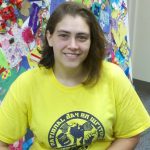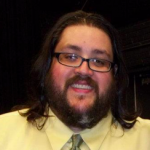2012 National Day on Writing
(Today’s blog post comes from Christina Bethel, PhD candidate and graduate teaching assistant in the department of English. Christina teaches primarily first-year writing courses; in her research, she investigates identity and the impact of identity performance on student writing practices.)
by Christina Bethel
 In Fall 2011, the Tar River Writing Project, in conjunction with the ECU English and Education departments, hosted the first National Day on Writing celebration at ECU, attended by around 200 local public school students and teachers. The event was such a success that we decided to expand the celebration. The Tar River Writing Project’s mission for this event is to engage local K-College students and teachers, as well as community members, in fun and enriching writing experiences. This year, the TRWP joined the University Writing Program, Joyner Library, and the Department of English in sponsoring the 2012 National Day on Writing @ ECU.
In Fall 2011, the Tar River Writing Project, in conjunction with the ECU English and Education departments, hosted the first National Day on Writing celebration at ECU, attended by around 200 local public school students and teachers. The event was such a success that we decided to expand the celebration. The Tar River Writing Project’s mission for this event is to engage local K-College students and teachers, as well as community members, in fun and enriching writing experiences. This year, the TRWP joined the University Writing Program, Joyner Library, and the Department of English in sponsoring the 2012 National Day on Writing @ ECU.
At the K-12 level, we brought over 500 students to campus on October 19, 2012. During the half-day field trip, students participated in three writing activities. For elementary and middle school students, we offered two new activities: a scene writing workshop, led by Hector Garza (Theatre & Dance), and a Halloween-themed writing workshop, facilitated by English department faculty Randall Martoccia and Jenn Sisk. We also offered our two most popular activities from last year: a digital writing studio (led by Stephanie West-Puckett and Rob Puckett) and a graffiti wall (led by former ECU art instructor Cynthia Gibb). In our exit survey, students wrote that they enjoyed rapping about their favorite foods, expressing themselves through words and art, sharing their writing aloud with others, and getting to hear what great writers their peers and classmates are!
…
2012 National Day on Writing Read More »
